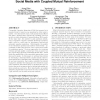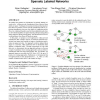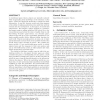453 search results - page 54 / 91 » Information Theory, Inference, and Learning Algorithms |
ITICSE
2004
ACM
14 years 1 months ago
2004
ACM
The use of generic and generative methods for the development and application of interactive educational software is a relatively unexplored area in industry and education. Advant...
WWW
2009
ACM
14 years 8 months ago
2009
ACM
Community Question Answering (CQA) has emerged as a popular forum for users to pose questions for other users to answer. Over the last few years, CQA portals such as Naver and Yah...
KDD
2008
ACM
14 years 8 months ago
2008
ACM
We address the problem of classification in partially labeled networks (a.k.a. within-network classification) where observed class labels are sparse. Techniques for statistical re...
ICS
2010
Tsinghua U.
14 years 5 months ago
2010
Tsinghua U.
: The generic problem of estimation and inference given a sequence of i.i.d. samples has been extensively studied in the statistics, property testing, and learning communities. A n...
SIGECOM
2006
ACM
14 years 2 months ago
2006
ACM
In traditional game theory, players are typically endowed with exogenously given knowledge of the structure of the game—either full omniscient knowledge or partial but fixed in...



